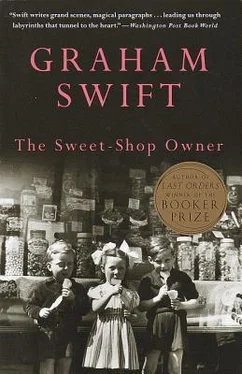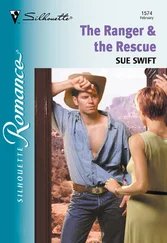Graham Swift - The Sweet-Shop Owner
Здесь есть возможность читать онлайн «Graham Swift - The Sweet-Shop Owner» весь текст электронной книги совершенно бесплатно (целиком полную версию без сокращений). В некоторых случаях можно слушать аудио, скачать через торрент в формате fb2 и присутствует краткое содержание. Год выпуска: 2012, Издательство: Vintage Books USA, Жанр: Современная проза, на английском языке. Описание произведения, (предисловие) а так же отзывы посетителей доступны на портале библиотеки ЛибКат.
- Название:The Sweet-Shop Owner
- Автор:
- Издательство:Vintage Books USA
- Жанр:
- Год:2012
- ISBN:нет данных
- Рейтинг книги:4 / 5. Голосов: 1
-
Избранное:Добавить в избранное
- Отзывы:
-
Ваша оценка:
- 80
- 1
- 2
- 3
- 4
- 5
The Sweet-Shop Owner: краткое содержание, описание и аннотация
Предлагаем к чтению аннотацию, описание, краткое содержание или предисловие (зависит от того, что написал сам автор книги «The Sweet-Shop Owner»). Если вы не нашли необходимую информацию о книге — напишите в комментариях, мы постараемся отыскать её.
The Sweet-Shop Owner — читать онлайн бесплатно полную книгу (весь текст) целиком
Ниже представлен текст книги, разбитый по страницам. Система сохранения места последней прочитанной страницы, позволяет с удобством читать онлайн бесплатно книгу «The Sweet-Shop Owner», без необходимости каждый раз заново искать на чём Вы остановились. Поставьте закладку, и сможете в любой момент перейти на страницу, на которой закончили чтение.
Интервал:
Закладка:
And what do you first remember, Dorry? When do the dates begin and the shapes first emerge? When did you first see — was it from the classroom at St Stephen’s Primary where you learnt what your name meant, in Miss Hale’s lesson or Miss Shepherd’s — the patterns forming, beyond the window?
Was it the yellow wallpaper in the room where we put your cot, or the dappled curtains — leaves and flowers round which butterflies flew? Or the cot itself, the wooden bars, the blue rattle shaped like a rabbit and the floppy doll made of knitted wool? That room became your own bedroom, the bedroom of a young lady, a single bed with a white bedspread and shelves for your books — and it’s still just as you left it. Was it those things, Dorry? Or was it the smell of soap and powder, the touch of the warm water in the little enamel bath? I always thought you would scream and struggle when I put you in. I’d dry you, dust you with talc and carry you in your flannel nightdress to your cot. The room would be warm from the electric fire. I’d say ‘Sshh’ and ‘There, there’, tucking you in; play with the woollen doll, which we called Winnie, making it dance on the rail of the cot, till your eyes began to close, and I’d kiss you and turn off the light. Do you remember that? Or was it rather the darkness: lying awake and feeling, too, as I shut the door, like an abandoned toy?
Irene would lie awake as well. Her health was weak even before you were old enough to know it. I wouldn’t know which one of you to tend first. But she’d nod, beside me, towards the door, reach for the water and the pills and lie back as if she were glad there was a reason why I couldn’t give her all my attention. Then I’d scuffle through to you, in my pyjamas and dressing-gown, say ‘Sshh’ and ‘It’s all right now’; change your clothes. Do you remember those moments, Dorry, in the early hours? Sometimes I’d pick you up and walk you round the room. You were fascinated by the twirled red and blue tassels at the end of my dressing-gown cord. And sometimes I’d forget, and listen out, as I held you, for her breathing and wonder what she was thinking — whether, perhaps, that I’d for-saken her. I’d tiptoe back. How fragile her face was on the pillow.
You thought she made a slave of me.
But she was alone with you all day, with all the chores to do. She used to push you in the pram down the hill to the shops in Common Road. Do you remember the ration book in her hand and the assistant licking her pencil, taking down the order? Flour, tea, sugar in blue bags. The shop girls fussed over you. When you were older they used to sit you on the counter and give you broken biscuits; though you didn’t like that — you were afraid you’d be left in the shop — and once you screamed at the man, smiling, leaning over the bacon-slicer. But she wouldn’t have left you. And that grim look in her face, as she wheeled you home; it wasn’t what you think. It took all her breath, that push up the hill. And it would have been so much further to push, back from the High Street. I might have sat you on my counter, fetched you something from the sweet-rack, shown you off to my customers. But she never did come to the shop: my customers never saw my wife. They had to pump Mrs Cooper for gossip.
She used to buy you instructive toys — do you remember, the coloured bricks, the wooden jig-saw with the picture of farmyard animals? — to keep you occupied. She’d sit in her chair and watch you on the carpet. But you didn’t know what to do. You took it all so seriously. You cried when the pieces wouldn’t fit, and it became a kind of system, that playing; do it right and she’d kiss you, build the bricks and you’d get your reward. It wasn’t her fault. It taxed her, looking after you while she was ill. Don’t you remember how relieved she was when I returned in the evenings? I’d walk up from the common with my briefcase and my coat over my arm and something, often, in crackly paper, in my pocket for you. You’d wait for me, your head in the corner of the bay window, pulling the curtain back. She used to come to the door holding you, as if to make sure I would take you from her. Didn’t you see how relieved she was, slipping away into the kitchen, when I picked you up? And didn’t you see how when I lifted you up in my arms and kissed you, she wouldn’t kiss me ?
Did you judge us, Dorry, even then? If the word love is never spoken, does it mean there isn’t any love? If she never kissed me in front of you …
But she wasn’t that kind of woman. You used to look at that firm, unyielding expression of hers and wonder why I plodded year after year for her at the shop — till you stopped wondering and began to despise me instead. But you never looked closely at that face, into those blue-grey eyes, because if you had you would have seen how much more she knew than you.
Was it her face then? Was that how you first discerned the patterns forming? Her face. Pale, and the smoothness being furrowed and the cheeks beginning to slacken. You had her looks. At the christening they saw that. ‘She’ll be beautiful too,’ murmured Smithy, and Irene looked up. Only the mouth, they said, was like mine, a little loose, a little heavy, as if the things it said would bear a tone of resentment. Was that it? Did you feel that face read your own? And did you feel: whatever I do, she will have predicted it; whatever I do, it will not be my own?
How bright those eyes. And the hair, too, kept its lustre, even when her skin had faded. Your hair was black and glossy, but it never had the blaze of her deep chestnut. Yet you used to toss it from side to side in a way she never did, and you had that lightness and deftness of step as if you’d have liked to dance — if only someone had let you.
Was that how you first saw? Or was it the summer holidays (how quick those years); the long ride in the train, the sea rippling out to the Isle of Wight, the yachts, and the rusty, tarry smells of the pier? We took you up to Waterloo with our suitcases and bags, and little did you know how that journey of ours was already history. That railway line. New houses in Esher and Weybridge, new signs on the stations, and cars, Prefects and Zephyrs, passing down the roads where once the army transports had rumbled. The same and not the same. And that familiar Dorset scenery, green downs and bleached cliffs, unchanged. We might have gone elsewhere, to Wales, to Norfolk, but (since we had to go) she was against anywhere new. Nothing new. Yet (how could you defy her?) everything was eternally new; the old cry of the sea-gulls, the old tingle of the breeze, the old mystery of the rock-pools — how you loved to squat and explore those delicate little worlds.
Did you sense how she shrank from all that? And did you sense how that scene in which you stood for the first time had already been encountered before and its limits fixed? The sea air was good for her. She used to sit in the deck-chair outside the beach hut, and read the papers. Even on holiday she read the papers. And when she wasn’t reading, or leaning back, her face turned from the sun, she’d watch you and me digging holes and making walls to stop the sea, in the same way as she watched you playing on the carpet. She wore a straw sun-hat and a wide, striped cotton frock, and only now and then would she be persuaded — she who should still have been glad to show herself — to change into her swimming costume and tread down to the water. When she did so (did you notice?) it was like a kind of concession: ‘Yes, I allow you this — just so much.’ And when you watched her closely there was that look of panic in her eyes. Slowly, hesitantly, the three of us — you in the middle — into the waves.
Other people noticed her, other people admired. Though she’d never known how to deal with their glances except by lowering her own eyes. Settling the sun-glasses more firmly, pulling the paper more closely round her. People wondered at her, and wondered even more when they saw me beside her, with my lumpish looks, the beginning of a paunch and my limp. You wouldn’t have known I was once a mile-runner. The sea air was good for her. She could sit and breathe freely on the beach. But she wouldn’t come up, in the evening, for walks on the cliffs. Peveril Point and Durlston Head. Shimmer of the sea; crickets in the long grass; the lighthouse beacon blinking in the dusk. Memories stalked those paths. And she didn’t come when I took you, in the bus, to Corfe. We clambered up the ruined castle, and had ice-cream and lemonade. Years later you would have visited such a place with studious reverence; devoured the guide-books; scoured the stones. Ancient monuments; churches; places of historical interest: your eyes hungry for knowledge. But your gaze hadn’t acquired that seriousness then (or had it?). Running down the turf slopes, by the frozen tumbles of masonry. It rained. The bus back smelt of wet plastic macs. When we returned she was lying in the bedroom of our holiday flat and I couldn’t tell whether she was glad or sorry we’d spent the day without her.
Читать дальшеИнтервал:
Закладка:
Похожие книги на «The Sweet-Shop Owner»
Представляем Вашему вниманию похожие книги на «The Sweet-Shop Owner» списком для выбора. Мы отобрали схожую по названию и смыслу литературу в надежде предоставить читателям больше вариантов отыскать новые, интересные, ещё непрочитанные произведения.
Обсуждение, отзывы о книге «The Sweet-Shop Owner» и просто собственные мнения читателей. Оставьте ваши комментарии, напишите, что Вы думаете о произведении, его смысле или главных героях. Укажите что конкретно понравилось, а что нет, и почему Вы так считаете.












